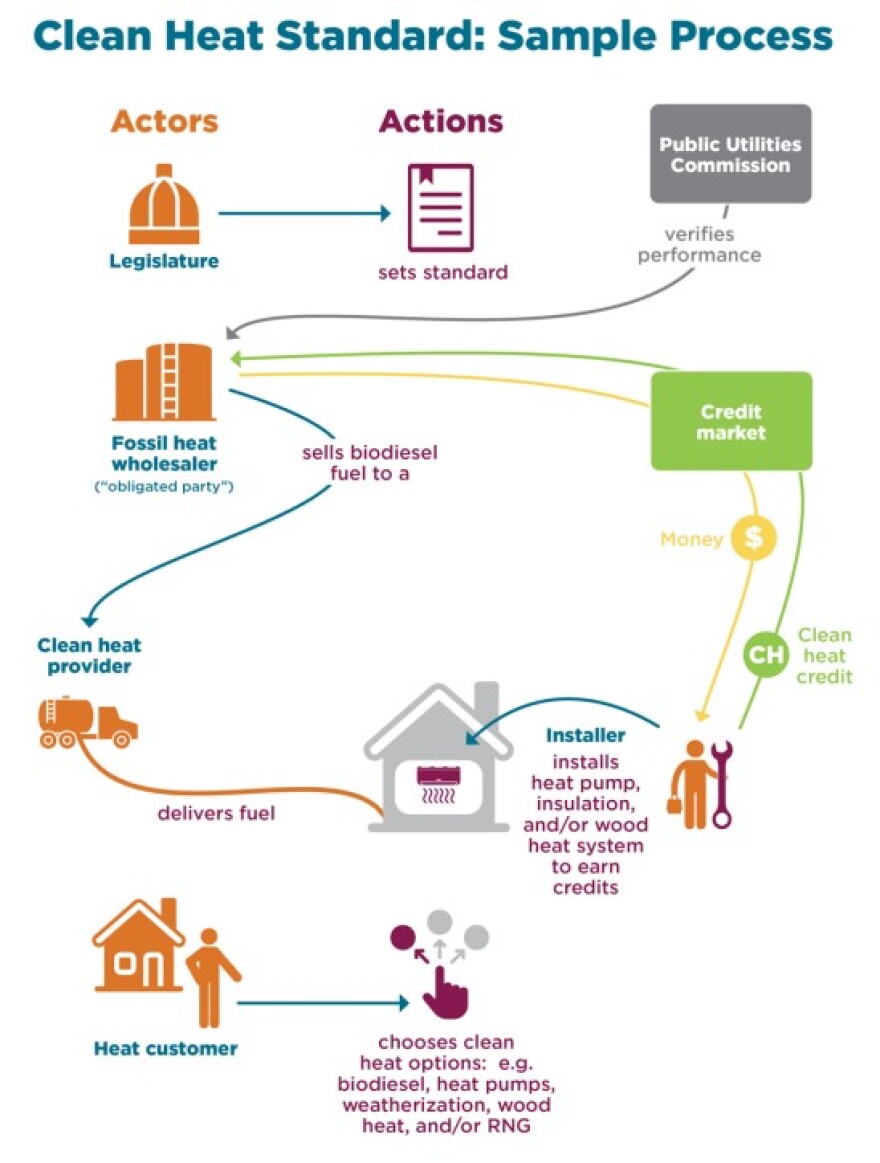Live call-in discussion: Lawmakers are considering a bill that would transform how Vermonters heat their homes, businesses and other buildings. The legislation would also institute major changes for the businesses that supply fossil fuels throughout the state. This hour, we're talking about the proposed Clean Heat Standard that's making its way through the state legislature, and what the changes would mean for Vermonters.

Our guests are:
- Rep. Laura Sibilia, an Independent lawmaker from Dover who serves as the vice chair of the House Energy and Technology Committee
- Brian Gray, who represents the fuel sector on Vermont’s Climate Council and is the manager of the Energy Co-op of Vermont
- Matt Cota, executive director of the Vermont Fuel Dealers Association
- Jared Duval, a Climate Council member and executive director of Energy Action Network of Vermont
Rep. Sibilia told Vermont Edition that advancing the Clean Heat Standard would transform how Vermont heats its buildings, by using a credit system to incentivize businesses now selling fossil fuels to also sell lower-emission alternatives.
The program is all designed to curb the state’s greenhouse gas emissions from the heating homes, businesses and other buildings.
Sibilia said actions to cut Vermont's emissions won’t end global climate change on their own. But she stressed that if the state doesn't act to curb its emissions, Vermonters could be at the whim of volatile fuel prices on the global market in the years ahead.
“The bigger actors, the bigger states, they are taking action. And their actions will have consequences. And the actions that they take to reduce their emissions, those are market forces that will impact Vermonters, and that we’re seeing impact Vermonters now," she said.
Those market forces can be seen in the price hikes for heating fuels like propane and fuel oil, which jumped by more than a dollar per gallon in Vermont over the last five months.
The bill is gaining support with some fuel dealers.
Selling “biofuels” — liquid fuels derived from cooking oil or crops, rather than petroleum — could earn fuel dealers credits under the Clean Heat Standard now being considered in the Vermont Legislature.
Energy Co-op of Vermont manager Brian Gray also represents the fuel sector on Vermont’s climate council.
He says including biofuels like biodiesel — which can be a mixture of fossil fuel and biofuels — ensures a path forward for Vermont’s more than 100 small fuel dealers.
“Having biodiesel available as one of the credit options for fuel dealers allows them to pretty much continue ‘business as usual’ with some slight tweaks, with much cleaner fuel,” he said.
Some have criticized the inclusion of biofuels in the Clean Heat Standard, due to the energy — and emissions — usually needed to produce them.
Gov. Phil Scott said he ultimately wants elected officials to have the final say on what rules the bill would implement to reduce Vermont's heating emissions, but Rep. Sibilia said House lawmakers don't plan to make the changes the governor is asking for.
The Clean Heat Standard bill calls on businesses selling fossil fuels to start collecting clean heat credits, which can come from doings things to reduce or eliminate greenhouse gas emissions from heating buildings.
Much of the work for creating the clean heat credit system falls to the Public Utility Commission, and Gov. Scott said he wants those decisions to instead be voted on by elected officials.
“I think they should have that come back," Scott said Tuesday, referring to the PUC's system coming back before lawmakers for a final review—and vote—before it becomes law. "If they were to add that, then maybe we could make that work."
Rep. Sibilia told Vermont Edition that House lawmakers already rejected an amendment with a similar aim of having to vote on the Public Utility Commission’s credit system.
“Primarily we didn’t support it because it shortcuts the public engagement process. So we, we would not," she said.
The Vermont House passed the Clean Heat Standard bill earlier this month. It’s now in the Senate.
Broadcast live on Thursday, March 24, 2022 at noon; rebroadcast at 7 p.m.
Have questions, comments or tips? Send us a message or tweet us @vermontedition.






